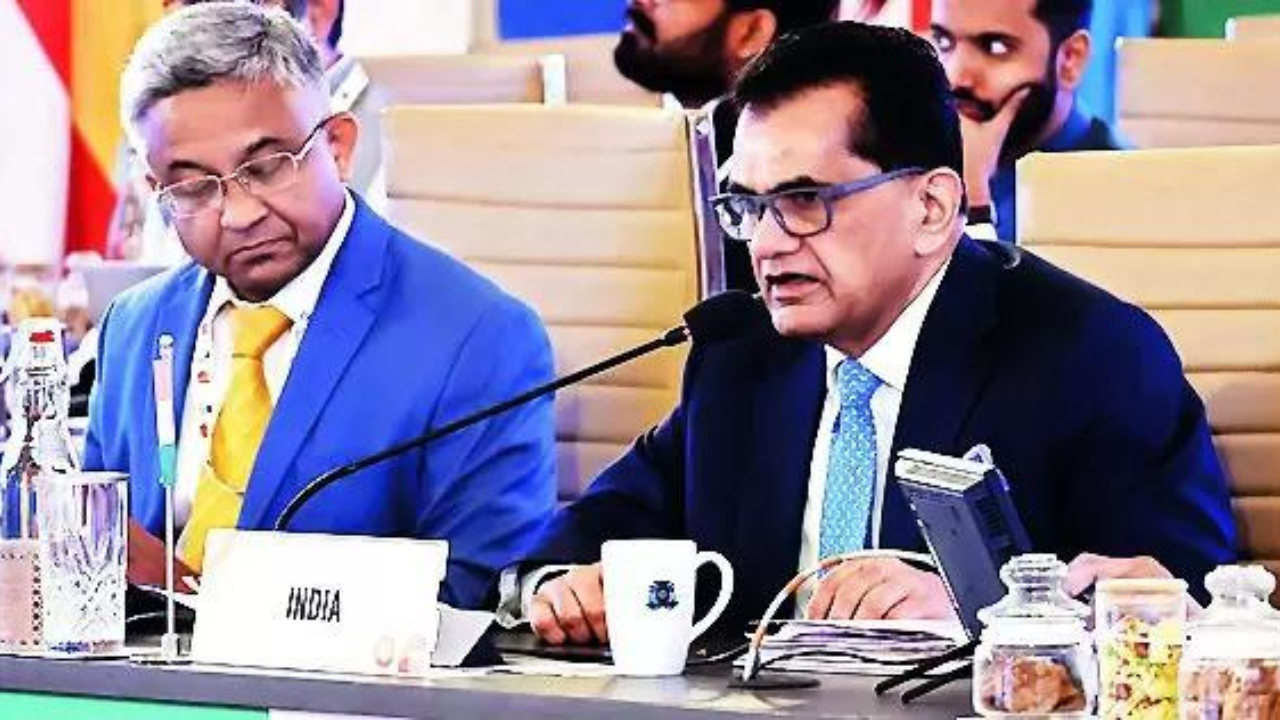Business
India’s fintrack agenda may need strong push

[ad_1]
NEW DELHI: India’s priorities will need a strong push at the meeting of deputies of the G20 finance track as there has been no consensus on at least two issues – a framework to regulate crypto assets and debt restructuring of vulnerable nations.
On the reform of the multilateral development banks, while there appears to be consensus on the need to expand their mandate, it is unclear if countries will immediately agree to provide capital or wait for greater leverage and innovative instruments to play their part.
As the deputies of the finance track meet in the Capital, days before the leaders’ summit over the weekend, economic affairs secretary Ajay Seth has a tough task ahead of him not only to work out the contours of regulatory framework on crypto assets between G20 nations around the IMF-Financial Stability Board (FSB) synthesis paper, but also get a consensus language on the global tax architecture.
Officials said there are multiple strands of thought on crypto regulation, with a strong divergence seen between India and the European nations. An earlier FSB report, submitted before the meeting of finance ministers and central bank governors in Gandhinagar in July, was rejected by India as it did not address several of its concerns. A paper released by the Board of International Settlements, too, was seen to have gaps.
India wants the synthesis paper to specifically address aspects such as consumer and investor protection, market integrity, impact on monetary policy, monetary sovereignty and other macro-economic concerns.
Besides, cyber security, terror finance and money laundering need special attention – something that has been flagged by Prime Minister Narendra Modi, home minister Amit Shah and finance minister Nirmala Sitharaman. With only the synthesis paper being released before the G20 summit, chances are that no significant headway would be made and at best, the leaders will take note of the work that has been done so far.
There is little chance of China agreeing to soften its stance on the debt restructuring plan as well, where it is seen as the sole stumbling block due to its large exposure to several developing and poor countries in Asia and Africa. Beijing is insisting that it should not be made party to the restructuring exercise and wants to settle the issue on its own terms.
In the case of multilateral development banks – where India set up an independent expert group co-chaired by former US treasury secretary Larry Summers and 15th finance commission chairman N K Singh – there appears to be broad appreciation of the work done and the need to expand the mandate, but a final decision on how to go about the task can only come after the leaders’ meeting as the panel will submit its second report at the Fund-Bank meeting in Marrakech next month.
The government is, however, hopeful that it will be taken on board during India’s presidency. The fourth priority relating to digital public infrastructure on which a definition is likely to be finalised, a task that is divided between the finance and the sherpa tracks.
On the reform of the multilateral development banks, while there appears to be consensus on the need to expand their mandate, it is unclear if countries will immediately agree to provide capital or wait for greater leverage and innovative instruments to play their part.
As the deputies of the finance track meet in the Capital, days before the leaders’ summit over the weekend, economic affairs secretary Ajay Seth has a tough task ahead of him not only to work out the contours of regulatory framework on crypto assets between G20 nations around the IMF-Financial Stability Board (FSB) synthesis paper, but also get a consensus language on the global tax architecture.
Officials said there are multiple strands of thought on crypto regulation, with a strong divergence seen between India and the European nations. An earlier FSB report, submitted before the meeting of finance ministers and central bank governors in Gandhinagar in July, was rejected by India as it did not address several of its concerns. A paper released by the Board of International Settlements, too, was seen to have gaps.
India wants the synthesis paper to specifically address aspects such as consumer and investor protection, market integrity, impact on monetary policy, monetary sovereignty and other macro-economic concerns.
Besides, cyber security, terror finance and money laundering need special attention – something that has been flagged by Prime Minister Narendra Modi, home minister Amit Shah and finance minister Nirmala Sitharaman. With only the synthesis paper being released before the G20 summit, chances are that no significant headway would be made and at best, the leaders will take note of the work that has been done so far.
There is little chance of China agreeing to soften its stance on the debt restructuring plan as well, where it is seen as the sole stumbling block due to its large exposure to several developing and poor countries in Asia and Africa. Beijing is insisting that it should not be made party to the restructuring exercise and wants to settle the issue on its own terms.
In the case of multilateral development banks – where India set up an independent expert group co-chaired by former US treasury secretary Larry Summers and 15th finance commission chairman N K Singh – there appears to be broad appreciation of the work done and the need to expand the mandate, but a final decision on how to go about the task can only come after the leaders’ meeting as the panel will submit its second report at the Fund-Bank meeting in Marrakech next month.
The government is, however, hopeful that it will be taken on board during India’s presidency. The fourth priority relating to digital public infrastructure on which a definition is likely to be finalised, a task that is divided between the finance and the sherpa tracks.
#Indias #fintrack #agenda #strong #push





